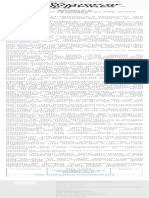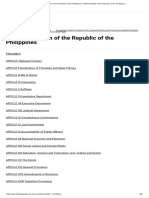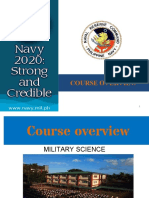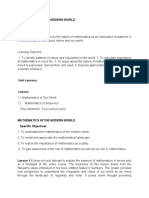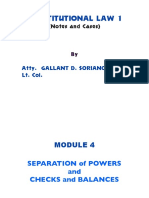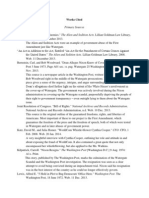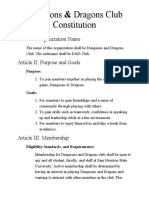Pa 103-Philippine Administrative Thoughts and Institutions Bachelor in Public Administration
Uploaded by
Ronalyn CaguetePa 103-Philippine Administrative Thoughts and Institutions Bachelor in Public Administration
Uploaded by
Ronalyn CaguetePA 103- PHILIPPINE ADMINISTRATIVE THOUGHTS AND INSTITUTIONS
Bachelor in Public Administration
MODULE 2
THE 1987 CONSTITUTION OF THE REPUBLIC OF THE PHILIPPINES
ARTICLE II
DECLARATION OF STATE POLICIES
For better understanding of the whole concepts of the Philippine Government, it is necessary to
discuss the declaration of state policies as stated in the Article II of 1987 Constitution. This sets the
overall picture of the general policies of the state as response to its principles.
At the end of this lesson the student should be able to:
1. Understand the overall state policies;
2. Understand the sections 7 to 28 of the Article II of the Philippine Constitution;
3. Explain the sections 7 to 28 of the Article II of the Philippine Constitution.
SECTION 7. The State shall pursue an independent foreign policy. In its relations with other states the
paramount consideration shall be national sovereignty, territorial integrity, national interest, and the right
to self- determination.
Foreign policy is a set of guidelines followed by a government of a country in order to
promote its national interest through the conduct of its relations with other countries.
Formulation and Conduct of Foreign Policy
The president formulates our foreign policy principally with the help of the Department of
Foreign Affairs. An instrument of domestic policy. Foreign policy is but a reflection and an instrument
Batangas State University
Pablo Borbon Campus
PA 103- PHILIPPINE ADMINISTRATIVE THOUGHTS AND INSTITUTIONS
Bachelor in Public Administration
of domestic policy, the former being dictated by the latter. They are not only mutually consistent but
complementary.
Pursuit of an independent foreign policy. An independent foreign policy means one that is not
subordinate or subject to nor dependent upon the support of another government. An independent
foreign policy, however, it is not one that completely rejects advice or assistance from without.
In general, our basic foreign policy objective is: to establish friendly relations with all
countries of the world regardless of race, religion, ideology and social system and to promote as much
beneficial relationship with them particularly in economic and trade activities.
Paramount consideration: In its relations with other states, the paramount consideration of the
Philippines shall be:
1. national sovereignty,
2. territorial integrity,
3. national interest,
4. the right to self-determination.
SECTION 8. The Philippines, consistent with the national interest, adopts and pursues a policy of
freedom from nuclear weapons in its territory.
SECTION 9. The State shall promote a just and dynamic social order that will ensure the prosperity and
independence of the nation and free the people from poverty through policies that
1. provide adequate social services,
2. promote full employment,
3. a rising standard of living,
4. and an improved quality of life for all.
Policies necessary to be pursued:
a. adequate social services,
b. promote full employment,
c. rising standard of living,
d. improved quality of life for all.
The goal is to reduce that political and economic power of privileged few by equalizing widely
differing standards and opportunities for advancement and raise the masses of our people from a
life of misery and deprivation to a qualitative life worthy of human dignity and respect.
Batangas State University
Pablo Borbon Campus
PA 103- PHILIPPINE ADMINISTRATIVE THOUGHTS AND INSTITUTIONS
Bachelor in Public Administration
SECTION 10. The State shall promote social justice in all phases of national development.
In the fulfillment of this duty, the State must give preferential attention to the welfare of the
less fortunate members of the community, those who have less in life.
SECTION 11. The State values the dignity of every human person and guarantees full respect for human
rights.
The individual enjoys certain rights which cannot be modified or taken away by the lawmaking
body. These rights are protected or guaranteed because of the belief in the inherent dignity and basic
moral worth of every human person. The human person is the end of every social organization. The
value accorded to human dignity is measured by the extent of respect for human rights, principally the
rights to life, liberty, and property (ART. 3, SEC. 1).
SECTION 12. The State recognizes the sanctity of family life and shall protect and strengthen the family
as a basic autonomous social institution. It shall equally protect the life of the mother and the life of the
unborn from conception. The natural and primary right and duty of parents in the rearing of the youth for
civic efficiency and the development of moral character shall receive the support of the
Government.(ART. XV)
SECTION 13. The State recognizes the vital role of the youth in nation-building and shall promote and
protect their physical, moral, spiritual, intellectual, and social well-being. It shall inculcate in the youth
patriotism and nationalism, and encourage their involvement in public and civic affairs.
The State recognizes the vital role of the youth in nation-building and shall promote and protect
their:
a. physical,
b. moral,
c. spiritual,
Batangas State University
Pablo Borbon Campus
PA 103- PHILIPPINE ADMINISTRATIVE THOUGHTS AND INSTITUTIONS
Bachelor in Public Administration
d. intellectual,
e. Social well-being.
It shall inculcate in the youth patriotism and nationalism, and encourage their involvement in
public and civic affairs.
SECTION 14. The State recognizes the role of women in nation-building, and shall ensure the
fundamental equality before the law of women and men.
Filipino women are noted to have low participation at all levels. The Civil Service Commission
reported that few women candidates - who ran for public office - succeeded in securing public posts. In
2004, the average proportion of women in key elected posts was no more than 17%. The dismal
performance of women in the 2004 elections registered a sharp drop after an increasing trend
beginning 1995.
SECTION 15. The State shall protect and promote the right to health of the people and instill
health consciousness among them.
The state shall oblige itself to promote and protect the right of the people to health by
instilling health consciousness among the people.
SECTION 16. The State shall protect and advance the right of the people to a balanced and
healthful ecology in accord with the rhythm and harmony of nature.
The state shall promote and protect the rights of the people about a balanced and
healthful environment.
SECTION 17. The State shall give priority to education, science and technology, arts, culture, and
sports to foster patriotism and nationalism, accelerate social progress, and promote total human liberation
and development.
Batangas State University
Pablo Borbon Campus
PA 103- PHILIPPINE ADMINISTRATIVE THOUGHTS AND INSTITUTIONS
Bachelor in Public Administration
The state shall provide education to all citizens to have a general and broader
understanding about knowledge.
SECTION 18. The State affirms labor as a primary social economic force. It shall protect the rights of
workers and promote their welfare.
In this provision, the state protects the rights of each and every worker.(See basic
Rights of Employees).
SECTION 19. The State shall develop a self-reliant and independent national economy
effectively controlled by Filipinos.
It states that the constitutional guidelines in the development of the economy:
economic self- reliance, independent national economy, and effective Filipino control of the
economy.
SECTION 20. The State recognizes the indispensable role of the private sector, encourages
private enterprise, and provides incentives to needed investments. (See PPP)
The state is mandated to encourage private enterprise and to provide incentives to needed
investments, whether local or foreign.
SECTION 21. The State shall promote comprehensive rural development and agrarian reform.
The state must develop rural and agrarian reform for the benefits of the country.
SECTION 22. The State recognizes and promotes the rights of indigenous cultural communities
within the framework of national unity and development.
Batangas State University
Pablo Borbon Campus
PA 103- PHILIPPINE ADMINISTRATIVE THOUGHTS AND INSTITUTIONS
Bachelor in Public Administration
The provision also directs the State to promote their rights within the framework of
national unity and development.
SECTION 23. The State shall encourage non-governmental, community-based, or sectoral
organizations that promote the welfare of the nation.
The state is required to encourage these organizations because recent events have
shown that, under responsible leadership, they can be active contributors to the political,
social, and economic growth of the country.
SECTION 24. The State recognizes the vital role of communication and information in nation-
building.
The state must keep abreast of communication innovations but at the same time be
selective and discriminating to insure that only those suitable to the needs and aspirations
of the nation are adapted.
SECTION 25. The State shall ensure the autonomy of local governments.
Local affairs can best be regulated by the people in the locality. See RA 7160 known as
Local Government Code of 1991.
SECTION 26. The State shall guarantee equal access to opportunities for public service, and
prohibit political dynasties as may be defined by law.
This does not allow the existence of political dynasties or the practice of keeping
political power within the control of selected families.
SECTION 27. The State shall maintain honesty and integrity in the public service and take
positive and effective measures against graft and corruption.
Batangas State University
Pablo Borbon Campus
PA 103- PHILIPPINE ADMINISTRATIVE THOUGHTS AND INSTITUTIONS
Bachelor in Public Administration
Honesty and integrity in public service. Undermines the quality of life for people
especially in poor qualities. The constitution seeks to minimize and find completely to
eliminate graft and corruption, a way to attack problems.
SECTION 28. Subject to reasonable conditions prescribed by law, the State adopts and
implements a policy of full public disclosure of all its transactions involving public interest.
The Subject to reasonable conditions prescribed by law, the State adopts and
implements a policy of full public disclosure of all its transactions involving public
interests.
Section 7 of the Bill of Rights Guarantees the people’s right to know any transaction
entered into by the government. Limited to things which involve public concerns.
1. As youth give an example for each of how the government promotes your physical, moral,
spiritual, intellectual, social well-being. Explain precisely each example.
Choose the letter of the correct answer.
1. Who formulates the foreign policy?
a. The DFA Secretary with the help of the President.
b. The DOLE Secretary with the help of the President.
c. The President with the help of the DFA Secretary.
d. The President with the help of the DOLE Secretary.
2. Which of the following does not belong to the group as to the policies that need to be prioritized
by the state?
a. promote full employment
b. independent foreign policy
c. rising standard of living
Batangas State University
Pablo Borbon Campus
PA 103- PHILIPPINE ADMINISTRATIVE THOUGHTS AND INSTITUTIONS
Bachelor in Public Administration
d. improved quality of life for all
3. These are the principal rights of every individual as stated in the constitution except:
a. life
b. love
c. liberty
d. property
4. The state has to ensure equal access to opportunities for public service. This implies that:
a. The state wishes to support political dynasties
b. The state wishes to support monarchy.
c. The state wishes to avoid monarchy.
d. The state wishes to avoid political dynasties
5. Section 14 is about.
a. gender equality
b. equal protection of citizen to law
c. equal opportunity for the poor and rich
d. none of these
Castro, Adrian. (2015, October 5). Article II Declaration of Principles and State Policies
(Explanation). http://iyhan09.blogspot.com/2015/10/article-ii.html
Batangas State University
Pablo Borbon Campus
You might also like
- PPG Q1 M7 Shianne-Dancee C.-Evanz - REVISED FINALNo ratings yetPPG Q1 M7 Shianne-Dancee C.-Evanz - REVISED FINAL17 pages
- Article II of The 1987 Philippine ConstitutionNo ratings yetArticle II of The 1987 Philippine Constitution29 pages
- 1987 Constitution Article II Declaration of Principles and State PoliciesNo ratings yet1987 Constitution Article II Declaration of Principles and State Policies3 pages
- The 1987 Constitution of The Republic of The PhilNo ratings yetThe 1987 Constitution of The Republic of The Phil1 page
- Understanding Article II Section 7-24 of The 1987 Constitution83% (12)Understanding Article II Section 7-24 of The 1987 Constitution7 pages
- Declaration of Principles and State PoliciesNo ratings yetDeclaration of Principles and State Policies3 pages
- The 1987 Constitution of The Republic of The Philippines - Article II Official Gazette of The Republic of The PhilippinesNo ratings yetThe 1987 Constitution of The Republic of The Philippines - Article II Official Gazette of The Republic of The Philippines1 page
- Understanding Article II Section 7 24 ofNo ratings yetUnderstanding Article II Section 7 24 of4 pages
- Article Ii-Declaration of Principles and State PoliciesNo ratings yetArticle Ii-Declaration of Principles and State Policies12 pages
- Declaration of Principle State and PoliciesNo ratings yetDeclaration of Principle State and Policies31 pages
- The 1987 Constitution of The Republic of The PhilippinesNo ratings yetThe 1987 Constitution of The Republic of The Philippines31 pages
- The Constitution of The Republic of The Philippines: GOVPH (/)No ratings yetThe Constitution of The Republic of The Philippines: GOVPH (/)57 pages
- NATIONAL TERRITORY The National Territory Comprises The Philippine ArchipelagoNo ratings yetNATIONAL TERRITORY The National Territory Comprises The Philippine Archipelago2 pages
- Philippine Gove32.5nment Contitution ARTICLE 2 20231013 025357 0000No ratings yetPhilippine Gove32.5nment Contitution ARTICLE 2 20231013 025357 000023 pages
- National Territory: Article 1 1987 Philippine ConstitutionNo ratings yetNational Territory: Article 1 1987 Philippine Constitution11 pages
- The 1987 Constitution of The Republic of The Philippines PreambleNo ratings yetThe 1987 Constitution of The Republic of The Philippines Preamble3 pages
- Elec 115 Voluntary Sector MGMT Bpa 4 Sibucao Jonathan I. 1 1No ratings yetElec 115 Voluntary Sector MGMT Bpa 4 Sibucao Jonathan I. 1 12 pages
- Article Ii Declaration of Principles and State Policies PrinciplesNo ratings yetArticle Ii Declaration of Principles and State Policies Principles3 pages
- Article II: Declaration of Principles and State PoliciesNo ratings yetArticle II: Declaration of Principles and State Policies29 pages
- The Constitution of The Republic of The Philippines: GOVPH (/)No ratings yetThe Constitution of The Republic of The Philippines: GOVPH (/)46 pages
- 1987 CONSTITUTION OF THE REPUBLIC OF THE PHILIPPINESNo ratings yet1987 CONSTITUTION OF THE REPUBLIC OF THE PHILIPPINES4 pages
- The Constitution of the Tunisian Republic: Unofficial TranslationFrom EverandThe Constitution of the Tunisian Republic: Unofficial TranslationNo ratings yet
- The South African State Of Affairs: Education, Politics, Economy And RaceFrom EverandThe South African State Of Affairs: Education, Politics, Economy And RaceNo ratings yet
- Pa 103-Philippine Administrative Thoughts and Institutions Bachelor in Public AdministrationNo ratings yetPa 103-Philippine Administrative Thoughts and Institutions Bachelor in Public Administration5 pages
- Mathematics in The Modern World Module One Core IdeaNo ratings yetMathematics in The Modern World Module One Core Idea7 pages
- Untold Story of The Bush White House EmailsNo ratings yetUntold Story of The Bush White House Emails57 pages
- Almario VS The Executive Sec, 701 Scra 269No ratings yetAlmario VS The Executive Sec, 701 Scra 26916 pages
- T3 B1 EOP - Press Interviews of Staff FDR - Internal Transcript - 2-29-02 CBS Interview of Gen Mark V Rosenker - White House Military Office Director - Angel Is Next - He Didnt Say GoddammitNo ratings yetT3 B1 EOP - Press Interviews of Staff FDR - Internal Transcript - 2-29-02 CBS Interview of Gen Mark V Rosenker - White House Military Office Director - Angel Is Next - He Didnt Say Goddammit12 pages
- Neri v. Senate Committee, G.R. No. 180643, March 25, 2008No ratings yetNeri v. Senate Committee, G.R. No. 180643, March 25, 200823 pages
- By-Laws: Philippine Association of Academic/Research Librarians, IncNo ratings yetBy-Laws: Philippine Association of Academic/Research Librarians, Inc6 pages
- Constitutional Law 1: (Notes and Cases)No ratings yetConstitutional Law 1: (Notes and Cases)23 pages
- Constitutional Law Finals Reviewer LETS GO100% (1)Constitutional Law Finals Reviewer LETS GO24 pages
- Instant download Analyzing American Democracy Politics and Political Science Jon R. Bond pdf all chapter100% (1)Instant download Analyzing American Democracy Politics and Political Science Jon R. Bond pdf all chapter55 pages
- Instant ebooks textbook Anesthesia Student Survival Guide A Case Based Approach 3rd Edition Jesse M. Ehrenfeld download all chapters100% (1)Instant ebooks textbook Anesthesia Student Survival Guide A Case Based Approach 3rd Edition Jesse M. Ehrenfeld download all chapters40 pages
- UCSP Module 7 - The Philippine Government and The Philippine Constitution75% (4)UCSP Module 7 - The Philippine Government and The Philippine Constitution20 pages
- Case Digests Involving The Executive DepartmentNo ratings yetCase Digests Involving The Executive Department22 pages
- Digest - Carbonilla Vs Board of Airlines (Separation of Powers, Non-Delegability of Legislative Powers, Completeness and Sufficient Standard Tests)No ratings yetDigest - Carbonilla Vs Board of Airlines (Separation of Powers, Non-Delegability of Legislative Powers, Completeness and Sufficient Standard Tests)6 pages
- Political Law Review - Answers For The First Module Allaric Luig Palmares J.D.-IVNo ratings yetPolitical Law Review - Answers For The First Module Allaric Luig Palmares J.D.-IV6 pages
- Akbayan - Estrada - David - Francisco Case DigestsNo ratings yetAkbayan - Estrada - David - Francisco Case Digests12 pages
- Digest G.R No. L-23825 15 SCRA 569 Pelaez vs. Auditor General100% (1)Digest G.R No. L-23825 15 SCRA 569 Pelaez vs. Auditor General2 pages
- 1987 Constitution Article II Declaration of Principles and State Policies1987 Constitution Article II Declaration of Principles and State Policies
- Understanding Article II Section 7-24 of The 1987 ConstitutionUnderstanding Article II Section 7-24 of The 1987 Constitution
- The 1987 Constitution of The Republic of The Philippines - Article II Official Gazette of The Republic of The PhilippinesThe 1987 Constitution of The Republic of The Philippines - Article II Official Gazette of The Republic of The Philippines
- Article Ii-Declaration of Principles and State PoliciesArticle Ii-Declaration of Principles and State Policies
- The 1987 Constitution of The Republic of The PhilippinesThe 1987 Constitution of The Republic of The Philippines
- The Constitution of The Republic of The Philippines: GOVPH (/)The Constitution of The Republic of The Philippines: GOVPH (/)
- NATIONAL TERRITORY The National Territory Comprises The Philippine ArchipelagoNATIONAL TERRITORY The National Territory Comprises The Philippine Archipelago
- Philippine Gove32.5nment Contitution ARTICLE 2 20231013 025357 0000Philippine Gove32.5nment Contitution ARTICLE 2 20231013 025357 0000
- National Territory: Article 1 1987 Philippine ConstitutionNational Territory: Article 1 1987 Philippine Constitution
- The 1987 Constitution of The Republic of The Philippines PreambleThe 1987 Constitution of The Republic of The Philippines Preamble
- Elec 115 Voluntary Sector MGMT Bpa 4 Sibucao Jonathan I. 1 1Elec 115 Voluntary Sector MGMT Bpa 4 Sibucao Jonathan I. 1 1
- Article Ii Declaration of Principles and State Policies PrinciplesArticle Ii Declaration of Principles and State Policies Principles
- Article II: Declaration of Principles and State PoliciesArticle II: Declaration of Principles and State Policies
- The Constitution of The Republic of The Philippines: GOVPH (/)The Constitution of The Republic of The Philippines: GOVPH (/)
- 1987 CONSTITUTION OF THE REPUBLIC OF THE PHILIPPINES1987 CONSTITUTION OF THE REPUBLIC OF THE PHILIPPINES
- The Constitution of the Tunisian Republic: Unofficial TranslationFrom EverandThe Constitution of the Tunisian Republic: Unofficial Translation
- The South African State Of Affairs: Education, Politics, Economy And RaceFrom EverandThe South African State Of Affairs: Education, Politics, Economy And Race
- Pa 103-Philippine Administrative Thoughts and Institutions Bachelor in Public AdministrationPa 103-Philippine Administrative Thoughts and Institutions Bachelor in Public Administration
- Mathematics in The Modern World Module One Core IdeaMathematics in The Modern World Module One Core Idea
- T3 B1 EOP - Press Interviews of Staff FDR - Internal Transcript - 2-29-02 CBS Interview of Gen Mark V Rosenker - White House Military Office Director - Angel Is Next - He Didnt Say GoddammitT3 B1 EOP - Press Interviews of Staff FDR - Internal Transcript - 2-29-02 CBS Interview of Gen Mark V Rosenker - White House Military Office Director - Angel Is Next - He Didnt Say Goddammit
- Neri v. Senate Committee, G.R. No. 180643, March 25, 2008Neri v. Senate Committee, G.R. No. 180643, March 25, 2008
- By-Laws: Philippine Association of Academic/Research Librarians, IncBy-Laws: Philippine Association of Academic/Research Librarians, Inc
- Instant download Analyzing American Democracy Politics and Political Science Jon R. Bond pdf all chapterInstant download Analyzing American Democracy Politics and Political Science Jon R. Bond pdf all chapter
- Instant ebooks textbook Anesthesia Student Survival Guide A Case Based Approach 3rd Edition Jesse M. Ehrenfeld download all chaptersInstant ebooks textbook Anesthesia Student Survival Guide A Case Based Approach 3rd Edition Jesse M. Ehrenfeld download all chapters
- UCSP Module 7 - The Philippine Government and The Philippine ConstitutionUCSP Module 7 - The Philippine Government and The Philippine Constitution
- Digest - Carbonilla Vs Board of Airlines (Separation of Powers, Non-Delegability of Legislative Powers, Completeness and Sufficient Standard Tests)Digest - Carbonilla Vs Board of Airlines (Separation of Powers, Non-Delegability of Legislative Powers, Completeness and Sufficient Standard Tests)
- Political Law Review - Answers For The First Module Allaric Luig Palmares J.D.-IVPolitical Law Review - Answers For The First Module Allaric Luig Palmares J.D.-IV
- Akbayan - Estrada - David - Francisco Case DigestsAkbayan - Estrada - David - Francisco Case Digests
- Digest G.R No. L-23825 15 SCRA 569 Pelaez vs. Auditor GeneralDigest G.R No. L-23825 15 SCRA 569 Pelaez vs. Auditor General
















